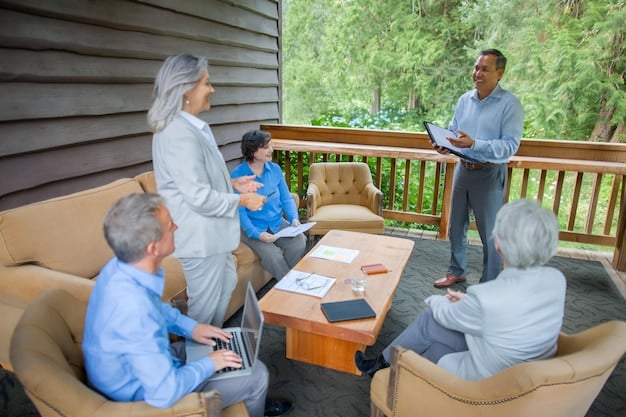Veterans Benefits: Your Guide to Healthcare, Education, and Housing

Veterans benefits encompass a range of healthcare, education, and housing assistance programs designed to support those who have served in the U.S. military, helping them transition back to civilian life and access essential services.
Navigating the landscape of veterans benefits can be overwhelming, but understanding the available healthcare, education, and housing assistance programs is crucial for those who have served our country. This guide provides a comprehensive overview of these vital resources.
Understanding Veterans Healthcare Benefits
Veterans healthcare benefits offer comprehensive medical services to eligible veterans, ensuring access to necessary care and treatment. These benefits are administered through the Department of Veterans Affairs (VA) and encompass a wide array of medical, surgical, and mental health services.
These benefits are not only crucial for physical well-being but also address the mental health challenges that many veterans face. Understanding the specifics of these healthcare benefits and how to access them is vital for veterans to receive the support they deserve.
Eligibility for VA Healthcare
To be eligible for VA healthcare, veterans typically need to meet certain service requirements and enrollment criteria. These criteria often involve the length of service, type of discharge, and any service-related disabilities.
Covered Medical Services
VA healthcare covers a wide range of medical services, including primary care, specialty care, surgery, mental health services, and rehabilitation. Understanding the full scope of these services can help veterans make informed decisions about their healthcare needs.
- Primary Care: Access to routine check-ups, preventive care, and treatment for common illnesses.
- Specialty Care: Consultations and treatments from specialists in areas such as cardiology, oncology, and neurology.
- Mental Health Services: Counseling, therapy, and medication management for mental health conditions.
- Rehabilitative Services: Physical therapy, occupational therapy, and speech therapy to help veterans recover from injuries or illnesses.

Understanding the comprehensive nature and eligibility for veteran healthcare benefits can significantly improve a veteran’s quality of life. By accessing these resources, veterans can receive the medical attention and support they need. These programs are integral to ensuring that those who have served are cared for during their transition and beyond.
Navigating Education Benefits for Veterans
Education benefits for veterans are designed to assist with the costs of attending college, vocational schools, and other educational programs. These benefits can significantly ease the financial burden of pursuing higher education or job training.
Understanding the different types of education benefits available and how to qualify can empower veterans to pursue their educational and career goals. These resources play a vital role in helping veterans transition into successful civilian careers.
The Post-9/11 GI Bill
The Post-9/11 GI Bill is one of the most popular education benefits for veterans, offering financial assistance for tuition, housing, and books. Eligibility is typically based on service after September 10, 2001.
Montgomery GI Bill
The Montgomery GI Bill is another education benefit that provides financial assistance for veterans pursuing education or training. Eligibility requirements differ from the Post-9/11 GI Bill and may be more suitable for some veterans.
- Tuition Assistance: Coverage for tuition and fees associated with attending college or vocational school.
- Housing Allowance: Monthly payments to help cover the costs of housing while attending school.
- Books and Supplies: Stipends to assist with the purchase of textbooks and other necessary supplies.
- Training Programs: Funding for vocational training and apprenticeship programs to develop job skills.
Education benefits for veterans represent a valuable opportunity to enhance skills and pursue career aspirations. By understanding and utilizing these resources, veterans can achieve their educational and professional goals. The combination of various programs like the Post-9/11 GI Bill and the Montgomery GI Bill ensures comprehensive support for veterans seeking to advance their education.
Exploring Housing Assistance Programs for Veterans
Housing assistance programs for veterans provide support to secure stable and affordable housing. These programs address the unique housing challenges that veterans may face, including homelessness, financial instability, and limited access to housing.
Understanding the different types of housing assistance programs available and how to access them is crucial for veterans seeking to improve their housing situation. These resources play a vital role in ensuring that veterans have a safe and stable place to call home.

VA Home Loan Guarantee
The VA Home Loan Guarantee program assists veterans in purchasing, building, or refinancing a home. This program provides a guarantee to lenders, reducing the risk of providing loans to veterans.
Homeless Assistance Programs
Various programs are available to assist homeless veterans, providing services such as housing, job training, and healthcare. These programs aim to help veterans transition from homelessness to stable housing and self-sufficiency.
- Rental Assistance: Programs that help veterans afford rental housing by providing subsidies or vouchers.
- Homeownership Assistance: Support for veterans who wish to purchase a home, including down payment assistance and mortgage financing.
- Transitional Housing: Temporary housing options for veterans who need a place to stay while they work toward securing permanent housing.
- Supportive Services: Case management, counseling, and other services to help veterans maintain stable housing.
Housing assistance programs for veterans offer essential support for securing stable and affordable housing. By understanding and leveraging these programs, veterans can overcome housing challenges and establish a secure home. The VA Home Loan Guarantee and homeless assistance programs stand out as critical resources, ensuring support for veterans in various housing situations.
Mental Health Support and Resources for Veterans
Mental health support is a critical component of veterans benefits, addressing the unique challenges that many veterans face upon returning to civilian life. These resources include counseling, therapy, and specialized programs tailored to the needs of veterans.
Recognizing the prevalence of mental health issues among veterans, such as PTSD, depression, and anxiety, the VA provides extensive mental health services. Understanding these resources and encouraging veterans to seek help can significantly improve their quality of life.
Counseling and Therapy Services
The VA offers a range of counseling and therapy services, including individual counseling, group therapy, and family counseling. These services are designed to address a variety of mental health concerns.
Specialized Programs for PTSD
Specialized programs are available for veterans with PTSD, providing evidence-based treatments such as Cognitive Processing Therapy (CPT) and Prolonged Exposure (PE). These programs aim to help veterans process traumatic experiences and develop coping skills.
Various mental health support systems, including counseling and PTSD programs, are critical in ensuring veterans receive comprehensive care. By understanding and utilizing these resources, veterans can overcome significant mental health challenges. The VA’s commitment to mental health support helps to improve the overall well-being and stability of veterans.
Career Counseling and Job Training for Veterans
Career counseling and job training programs are valuable resources that help veterans transition into civilian employment. These programs provide guidance, skill development, and networking opportunities to assist veterans in finding meaningful and sustainable careers.
Understanding the various career services offered by the VA and other organizations can empower veterans to pursue their professional goals. These resources play a critical role in ensuring that veterans can successfully translate their military skills into civilian jobs.
VA Career Counseling Services
The VA offers career counseling services to help veterans explore their career interests, assess their skills, and develop a career plan. Counselors provide guidance on job searching, resume writing, and interviewing skills.
Job Training Programs
Various job training programs are available to help veterans develop marketable skills and gain certifications in high-demand fields. These programs can provide hands-on training and apprenticeships to prepare veterans for specific careers.
- Apprenticeship Programs: Opportunities to learn a trade or skill through on-the-job training and classroom instruction.
- Vocational Training: Programs that provide training in specific vocational skills, such as automotive repair, culinary arts, and healthcare.
- Resume and Interview Workshops: Workshops that teach veterans how to write effective resumes and perform well in job interviews.
- Networking Events: Opportunities to connect with potential employers and learn about job openings.
Career counseling and job training programs are essential for helping veterans transition into successful civilian careers. The combination of individualized support, skill development, and networking opportunities ensures that veterans have the resources they need to achieve their professional goals. These VA services and available job training contribute to the overall well-being of veterans.
Financial Assistance and Compensation for Veterans
Financial assistance and compensation programs provide monetary support to veterans to address various financial needs. Understanding the eligibility criteria and application processes for these programs is essential for veterans to access the support they deserve.
Financial assistance can alleviate financial burdens, enabling veterans to focus on their health, education, and overall well-being. Many programs provide financial relief and compensation to veterans, acknowledging the sacrifices they have made.
Disability Compensation
Veterans with service-connected disabilities may be eligible for disability compensation, which provides monthly payments based on the severity of the disability. This compensation is intended to help veterans offset the financial impact of their disabilities.
Pension Benefits
Pension benefits are available to certain wartime veterans with limited income. These benefits provide monthly payments to help veterans meet their basic needs.
- Emergency Financial Assistance: Temporary financial support for veterans facing unexpected financial emergencies, such as job loss or medical expenses.
- Grants for Home Modification: Financial assistance for veterans who need to modify their homes to accommodate disabilities.
- Education and Training Stipends: Monthly payments to help cover living expenses while veterans are enrolled in approved education or training programs.
- Unemployment Compensation: Assistance for veterans who are unemployed and actively seeking work.
Financial assistance and compensation programs contribute significantly to the financial stability and well-being of veterans. The combination of disability compensation and pension benefits, along with other financial supports, underscores the commitment to supporting those who have served. By navigating these options, veterans can secure the financial resources they need to thrive.
| Key Benefit | Brief Description |
|---|---|
| 🏥 Healthcare | Comprehensive medical services through the VA. |
| 🎓 Education | GI Bill benefits for tuition and living expenses. |
| 🏡 Housing | Assistance programs for secure and affordable housing. |
| 💰 Financial Aid | Disability compensation and pension benefits. |
Frequently Asked Questions
▼
Veterans have access to comprehensive healthcare services through the VA, including primary care, specialty care, mental health services, and more. Eligibility and specific services may vary based on service history and other factors.
▼
The Post-9/11 GI Bill provides financial assistance for tuition, housing, and books for veterans pursuing education. It covers costs at colleges, universities, and vocational schools, aiding in career advancement.
▼
The VA offers programs that provide housing, job training, healthcare, and supportive services to homeless veterans. These programs help veterans transition to stable housing and self-sufficiency, ensuring a secure life.
▼
The VA provides comprehensive mental health services, including counseling, therapy, and specialized programs for PTSD. These resources address mental health challenges and aim to improve veterans’ overall well-being through dedicated care.
▼
Veterans can access career counseling and job training through the VA and other organizations. These services provide guidance, skill development, and networking opportunities to assist veterans in finding sustainable employment and advancing their careers.
Conclusion
Veterans benefits encompass a broad spectrum of support, addressing healthcare, education, housing, mental health, career development, and financial needs. By understanding and utilizing these resources, veterans can successfully transition to civilian life and achieve their personal and professional goals, ensuring a stable and prosperous future.





